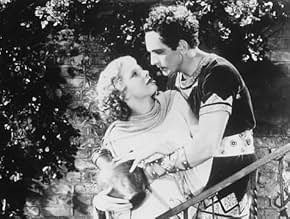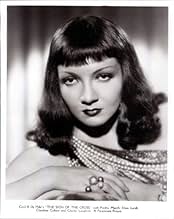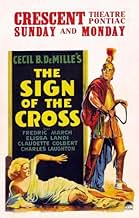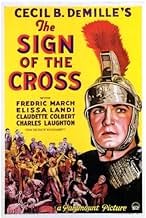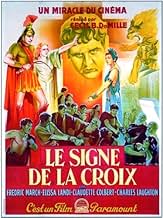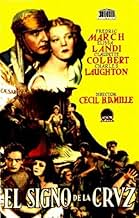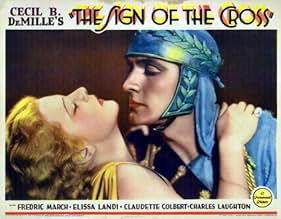AVALIAÇÃO DA IMDb
6,8/10
2,9 mil
SUA AVALIAÇÃO
Nero envia para arena os Cristãos, mas nunca contaria que Marcus intercederia por dois deles que seriam enviados para o sacrifício. Tudo porque se apaixonou por Mercia, filha de um dos que l... Ler tudoNero envia para arena os Cristãos, mas nunca contaria que Marcus intercederia por dois deles que seriam enviados para o sacrifício. Tudo porque se apaixonou por Mercia, filha de um dos que lutariam na arena.Nero envia para arena os Cristãos, mas nunca contaria que Marcus intercederia por dois deles que seriam enviados para o sacrifício. Tudo porque se apaixonou por Mercia, filha de um dos que lutariam na arena.
- Direção
- Roteiristas
- Artistas
- Indicado a 1 Oscar
- 3 vitórias e 1 indicação no total
Joyzelle Joyner
- Ancaria
- (as Joyzelle)
Robert Seiter
- Philodemus
- (as Robert Manning)
Avaliações em destaque
Great old DeMille flick about the persecution of Christians in ancient Rome. The movie starts with Emperor Nero (Charles Laughton) laughing and playing music while Rome burns. When someone reminds him that the people might hold Nero responsible, he quickly decides to blame the unpopular believers of the new Christian religion. As Christians are being rounded up and killed, Roman prefect Marcus (Fredric March) falls in love with a Christian girl (Elissa Landi). This doesn't sit well with Empress Poppaea (Claudette Colbert), who's in love with Marcus, and she conspires to have the girl arrested.
Charles Laughton gives an outrageously hammy performance and I loved every second of it. I wish he had been in the film a lot more. Fredric March is good, as always. Lovely Elissa Landi does an admirable job in probably her biggest role but she's eclipsed by Claudette Colbert. What this film is perhaps most famous for is the scene where Colbert takes a bath in donkey milk, in which we see quite a bit of what God gave Ms. Colbert to work with. She's a beautiful woman and it's a very sexy scene. The sets and costumes are great, as one expects from a Cecil B. DeMille picture. It's just a really good film, entertaining and dramatic, with some provocative bits of sex and violence that will surely please pre-Code fans. If for no other reason, see it for Colbert.
Charles Laughton gives an outrageously hammy performance and I loved every second of it. I wish he had been in the film a lot more. Fredric March is good, as always. Lovely Elissa Landi does an admirable job in probably her biggest role but she's eclipsed by Claudette Colbert. What this film is perhaps most famous for is the scene where Colbert takes a bath in donkey milk, in which we see quite a bit of what God gave Ms. Colbert to work with. She's a beautiful woman and it's a very sexy scene. The sets and costumes are great, as one expects from a Cecil B. DeMille picture. It's just a really good film, entertaining and dramatic, with some provocative bits of sex and violence that will surely please pre-Code fans. If for no other reason, see it for Colbert.
1932 – the height of the depression, Paramount studios in financial straits, Hollywood's output limited to small-scale dramas and bedroom comedies – and Cecil B. DeMille decides to make an epic. There are many classics among the "small" pictures of the early-30s, but it's good to see that someone was, against all odds, still carrying the torch for grandeur and spectacle.
Of course, Sign of the Cross is still an epic of its poverty-stricken time. There are no stupendous sets or masses of extras, but DeMille always knew how to make our eyes deceive us. A huddle of a dozen people filling the screen looks like a crowd. Five men on horseback shot from a low angle looks like a stampede. In the scene where Titus and Favius first meet, the camera wheels round and backs away at the same time, giving the impression that the street scene is much more than a cramped indoor set. And DeMille's use of lighting (here courtesy of Karl Struss who was Oscar-nominated for his efforts) really pays off, with fuzzy half-light and shadows disguising the lack of lavishness.
Better yet, the constrained budget seems to have pushed DeMille to concentrating more on the poetry and beauty of what we see. Unable to dazzle us with scale or special effects, he makes full use of his talent for flowing, dreamlike imagery. Sign of the Cross features some of the smoothest camera-work and carefully choreographed movement of extras of this period. He even makes effective use of slow-motion with the pouring goats milk. DeMille was not the only director to turn to simple camera trickery when money was tight – Rouben Mamoulian's earliest pictures for example are end-to-end cheap tricks. It's just that DeMille is doing it better than almost everyone else – it adds sparkle to the picture without being distracting.
But it's not just with the images that DeMille shows his talent. Unlike some directors who were sceptical about the coming of sound and tried to work around it, or some producers who naively thought it automatically made pictures twice as good, DeMille really explores the possibilities of sound. In an early scene, we cut to a close-up Elissa Landi while we hear from off-screen the calls of Romans searching for Christians. We see her reaction to the calls, and this is something that could not be achieved so succinctly in a silent movie. A more obvious example is the torture scene, where we hear the boy's screams, while the camera is pointed elsewhere. The point is, we do not need to see him being tortured because the scream alone has enough impact. However what we do see – the eagle of Rome, a sentry unconcernedly marching back and forth, a flaming torch – adds layers of meaning to the scene.
Of course, this being DeMille, and it being the "pre-code" era, he also seeks to dazzle us with a bit of bare flesh and other assorted depravities. It's one of the great ironies of DeMille's work that his pictures often revel in the very "immorality" they seek to preach against. So the poster advertising the attractions at the Colloseum is as much to whet the appetite of the real-world audience as to show the barbaric tastes of the Roman one. DeMille spends ten minutes of screen time (not to mention more precious money on tin-hat manufacture and zoo rental fees) on the promised blood-fest, which can only be for our entertainment since it is inconsequential to the plot. And, in another bit of audio/visual juxtaposition, while the martyrs' chanting drowns out the "Naked Moon" song, it is the notorious Lesbian dance that DeMille shows us, not the Christians outside.
The acting in Sign of the Cross is a bit of a mixed bag, although it is of a higher standard than many of the DeMille talkies. Charles Laughton is hammily brilliant, laying down a blueprint for Emperor Nero which Peter Ustinov would follow to a well-deserved Oscar-nomination in Quo Vadis (1951). However Laughton's part is fairly small, and the screenplay makes Claudette Colbert the real villain. Colbert is fantastic, playing the Empress as an ancient world vamp, giving by far the best performance of the bunch. It's almost a shame that It Happened One Night re-invented her as a major romantic lead, because she really was at her best when she played villains.
The weakest link in Sign of the Cross, as with many DeMille pictures, is the screenplay. However DeMille's inventiveness, careful construction and strong imagery, not to mention the fact that his pictures are great fun if you don't take them too seriously, transcend the limpness of the script. It was perhaps because DeMille refused to allow his style to be compromised by a limited budget that makes many of his 1930s pictures among his greatest.
Of course, Sign of the Cross is still an epic of its poverty-stricken time. There are no stupendous sets or masses of extras, but DeMille always knew how to make our eyes deceive us. A huddle of a dozen people filling the screen looks like a crowd. Five men on horseback shot from a low angle looks like a stampede. In the scene where Titus and Favius first meet, the camera wheels round and backs away at the same time, giving the impression that the street scene is much more than a cramped indoor set. And DeMille's use of lighting (here courtesy of Karl Struss who was Oscar-nominated for his efforts) really pays off, with fuzzy half-light and shadows disguising the lack of lavishness.
Better yet, the constrained budget seems to have pushed DeMille to concentrating more on the poetry and beauty of what we see. Unable to dazzle us with scale or special effects, he makes full use of his talent for flowing, dreamlike imagery. Sign of the Cross features some of the smoothest camera-work and carefully choreographed movement of extras of this period. He even makes effective use of slow-motion with the pouring goats milk. DeMille was not the only director to turn to simple camera trickery when money was tight – Rouben Mamoulian's earliest pictures for example are end-to-end cheap tricks. It's just that DeMille is doing it better than almost everyone else – it adds sparkle to the picture without being distracting.
But it's not just with the images that DeMille shows his talent. Unlike some directors who were sceptical about the coming of sound and tried to work around it, or some producers who naively thought it automatically made pictures twice as good, DeMille really explores the possibilities of sound. In an early scene, we cut to a close-up Elissa Landi while we hear from off-screen the calls of Romans searching for Christians. We see her reaction to the calls, and this is something that could not be achieved so succinctly in a silent movie. A more obvious example is the torture scene, where we hear the boy's screams, while the camera is pointed elsewhere. The point is, we do not need to see him being tortured because the scream alone has enough impact. However what we do see – the eagle of Rome, a sentry unconcernedly marching back and forth, a flaming torch – adds layers of meaning to the scene.
Of course, this being DeMille, and it being the "pre-code" era, he also seeks to dazzle us with a bit of bare flesh and other assorted depravities. It's one of the great ironies of DeMille's work that his pictures often revel in the very "immorality" they seek to preach against. So the poster advertising the attractions at the Colloseum is as much to whet the appetite of the real-world audience as to show the barbaric tastes of the Roman one. DeMille spends ten minutes of screen time (not to mention more precious money on tin-hat manufacture and zoo rental fees) on the promised blood-fest, which can only be for our entertainment since it is inconsequential to the plot. And, in another bit of audio/visual juxtaposition, while the martyrs' chanting drowns out the "Naked Moon" song, it is the notorious Lesbian dance that DeMille shows us, not the Christians outside.
The acting in Sign of the Cross is a bit of a mixed bag, although it is of a higher standard than many of the DeMille talkies. Charles Laughton is hammily brilliant, laying down a blueprint for Emperor Nero which Peter Ustinov would follow to a well-deserved Oscar-nomination in Quo Vadis (1951). However Laughton's part is fairly small, and the screenplay makes Claudette Colbert the real villain. Colbert is fantastic, playing the Empress as an ancient world vamp, giving by far the best performance of the bunch. It's almost a shame that It Happened One Night re-invented her as a major romantic lead, because she really was at her best when she played villains.
The weakest link in Sign of the Cross, as with many DeMille pictures, is the screenplay. However DeMille's inventiveness, careful construction and strong imagery, not to mention the fact that his pictures are great fun if you don't take them too seriously, transcend the limpness of the script. It was perhaps because DeMille refused to allow his style to be compromised by a limited budget that makes many of his 1930s pictures among his greatest.
Rome - First Century A. D. Nero, the mad Emperor & Poppaea, his vile Empress, engage in every sort of vice & degradation. Wanton cruelty becomes a spectator sport and virtue & innocence are denigrated. Slowly, however, a new Power is growing. People calling themselves Christians are secretly spreading their Faith ever more widely. They are horribly persecuted, but they continue to multiply. Which will eventually triumph - the might of Imperial Rome, or the gentle ones who follow THE SIGN OF THE CROSS?
This Cecil B. DeMille epic is a vivid retelling of the struggles of the first Christians. Paramount gave the film a lavish production and DeMille wrings every drop of piety & puerile interest possible from the plot. Fredric March is stalwart as the Roman official who falls in love with a beautiful Christian girl. While his ultimate conversion wouldn't convince the average modern Baptist, he holds his own in scenes with other performers whom are allowed to behave outrageously. Elissa Landi is sweet as the virtuous Believer, effectively underplaying her role.
`Do you want to play the most wicked woman in the world?' DeMille asked Claudette Colbert one day on the studio lot. She did & she does memorably, from her eye-popping milk bath scene to her revenge on her would-be lover. Sniveling, whining and wearing a huge fake nose, Charles Laughton is pure effeminate evil as Nero (notice his catamite), a foul blot on the face of humanity & stealing all his scenes from everyone else. History tells us that Nero eventually murdered Poppaea by stomping her to death...
Ian Keith is enjoyable as an unpunished villain. Ferdinand Gottshalk & Vivian Tobin are effectively degraded as Roman bacchants. Film mavens will recognize the voice of John Carradine, calling `We who are about to die, salute you!' out of the arena to Nero; he can later be spotted in the role of a Christian martyr ascending the dungeon stairs to his death.
DeMille had just returned to Paramount from a 3-year, 3-picture stint at MGM, where he was remarkably subdued. Back at his home studio he was allowed more license. Wrapping a little sermon up in a lot of sin, he filled this pre-Production Code drama with plenty of the latter. When THE SIGN OF THE CROSS was re-released in 1944, many cuts had to be made. The film now having been restored, it's not difficult to guess which sections those were. The Dance of the Naked Moon & much of the antics in the final arena sequence are beyond the bounds of good taste, but certainly not beyond the bounds of Cecil B. DeMille.
This Cecil B. DeMille epic is a vivid retelling of the struggles of the first Christians. Paramount gave the film a lavish production and DeMille wrings every drop of piety & puerile interest possible from the plot. Fredric March is stalwart as the Roman official who falls in love with a beautiful Christian girl. While his ultimate conversion wouldn't convince the average modern Baptist, he holds his own in scenes with other performers whom are allowed to behave outrageously. Elissa Landi is sweet as the virtuous Believer, effectively underplaying her role.
`Do you want to play the most wicked woman in the world?' DeMille asked Claudette Colbert one day on the studio lot. She did & she does memorably, from her eye-popping milk bath scene to her revenge on her would-be lover. Sniveling, whining and wearing a huge fake nose, Charles Laughton is pure effeminate evil as Nero (notice his catamite), a foul blot on the face of humanity & stealing all his scenes from everyone else. History tells us that Nero eventually murdered Poppaea by stomping her to death...
Ian Keith is enjoyable as an unpunished villain. Ferdinand Gottshalk & Vivian Tobin are effectively degraded as Roman bacchants. Film mavens will recognize the voice of John Carradine, calling `We who are about to die, salute you!' out of the arena to Nero; he can later be spotted in the role of a Christian martyr ascending the dungeon stairs to his death.
DeMille had just returned to Paramount from a 3-year, 3-picture stint at MGM, where he was remarkably subdued. Back at his home studio he was allowed more license. Wrapping a little sermon up in a lot of sin, he filled this pre-Production Code drama with plenty of the latter. When THE SIGN OF THE CROSS was re-released in 1944, many cuts had to be made. The film now having been restored, it's not difficult to guess which sections those were. The Dance of the Naked Moon & much of the antics in the final arena sequence are beyond the bounds of good taste, but certainly not beyond the bounds of Cecil B. DeMille.
One of the very first and one of the very best Roman epics on screen filled with DeMille's splendor!
A comment on the original 1932 version.
Pagan Rome, the third night of the great fire. Emperor Nero (Charles Laughton) unjustly condemns Christians of burning the eternal city and sentences many of them to martyrdom. He does not realize that through this deed he unconsciously opens for them a wonderful glory in a better world. The struggle between the sign of the Roman eagle of decadent Nero's times and the sign of the cross begins, this is, symbolically, the endless struggle between those with "delicious debauchery" as the sole aim of life (the lifestyle Nero's times promoted) and those heading for everlasting virtues like love, piety, forgiveness, and purity of heart. Cecil B DeMille's THE SIGN OF THE CROSS, being the first sound biblical epic after his silent KING OF KINGS (1927) is, though more than 70 years old, a great spectacle, still one of the most entertaining Roman epics, except for QUO VADIS (1951), SPARTACUS (1960), and BEN HUR (1959).
GREAT CAST: The outstanding cast in the movie are its strongest point. Claudette Colbert's portrayal of wicked, lustful Poppaea is gorgeous. The same can be said about Charles Laughton who portrays Nero as a really decadent emperor, entirely flooded in debauchery and all sorts of sinful lusts. There have been more portrayals of this cruel pair (Poppeae and Nero), but theirs from DeMille's film is real feast for the soul. Therefore, they are even more memorable than Elissa Landi and Fredric March playing the main roles of Mercia and Marcus. Indeed, March as Marcus Superbus does a good job, especially in the way he shows a change of heart from a mocker to a believer. Elissa Landi presents Mercia's innocence and virtues memorably. But they are not that terrific as Colbert and Laughton. As far as performances are concerned, it is also important to mention Joyzelle as "the most wicked and talented woman in Rome", Ancaria. The scene of her seduction is truly well played. The dance of the Naked Moon that Ancaria seduces on Mercia is disturbed by Christians singing in a dungeon. MORAL MESSAGE: That scene clearly expresses the fact I have mentioned at the beginning: the universal struggle between two groups of people with two different aims in life. I think that DeMille also wanted to show this moral in another scene: the meeting of two old Christian men, Favius and Titus sent by Paul to Rome. One of them draws the sign of the cross on the ground, which is later trodden on by many people walking in the square.
SIMILARITY TO ANOTHER EPIC: A significant fact is that the content of the movie is strikingly similar to another Roman epic, made almost 20 years later, QUO VADIS (1951) by Mervyn LeRoy. While QUO VADIS is based on the novel by Henryk Sienkiewicz, this film is based on a play by an English playwright, Wilson Barrett. Both films, however, present the 1st century Rome, in particular, spreading Christianity in the cruel times of Nero; both films show the conversion of a Roman soldier Marcus who loves a Christian girl; both films remind us of the secret Christian meetings; both films focus on Poppaea being lustful for Marcus and demanding revenge on Christians because of jealousy (consider the moment Marcus Superbus comes to Nero to ask him to spare the life of Mercia. Nero says: If she would publicly renounce her faith... when Poppaea disturbs radically: "Not even then!") Moreover, both films show Poppaea's beautiful leopards. Finally, THE SIGN OF THE CROSS and QUO VADIS show the arena sequence, however DeMille presents much more of its gore than LeRoy in 1951.
ARENA: Alligators feeding with a young Christian woman, elephants treading on people's heads, a gorilla raping a girl tied to a wooden pillar, people crucified and burned, men fighting with bulls, bears, women fighting with dwarfs; yet lions and tigers eating Christians, and many other cruel games to the joy and lust of the viewers. Indeed, it is a film not to be watched by kids even at the beginning of the 21 century, but historically accurate and visually very well made.
ONE OF CINEMA'S MOST MEMORABLE MOMENTS: Except for the cruel arena sequence, which is still entertaining in some way, any viewer will be surprised at one scene: Poppaea's famous milk bath. That's a moment that everyone should consider while watching the film. Her sexual bath is one of the best made moments that cinema has ever seen. It is totally filled with desire and sexuality. And all thanks to the great performance by Ms Colbert. No surprise Cecil B DeMille cast her to play Cleopatra two years later, in 1934.
It's difficult to express all I feel about this movie in one review. I simply tried my best to encourage everyone to see this movie because it was an unforgettable experience for me, one of the very best Roman epics of all time. If you have already seen QUO VADIS, you will find this movie very similar but, indeed, more DeMillean. The end is very much influenced by the 1930s cinema but very touching and universally true - the absolute victory always comes in the Sign of the Cross... 9/10
Pagan Rome, the third night of the great fire. Emperor Nero (Charles Laughton) unjustly condemns Christians of burning the eternal city and sentences many of them to martyrdom. He does not realize that through this deed he unconsciously opens for them a wonderful glory in a better world. The struggle between the sign of the Roman eagle of decadent Nero's times and the sign of the cross begins, this is, symbolically, the endless struggle between those with "delicious debauchery" as the sole aim of life (the lifestyle Nero's times promoted) and those heading for everlasting virtues like love, piety, forgiveness, and purity of heart. Cecil B DeMille's THE SIGN OF THE CROSS, being the first sound biblical epic after his silent KING OF KINGS (1927) is, though more than 70 years old, a great spectacle, still one of the most entertaining Roman epics, except for QUO VADIS (1951), SPARTACUS (1960), and BEN HUR (1959).
GREAT CAST: The outstanding cast in the movie are its strongest point. Claudette Colbert's portrayal of wicked, lustful Poppaea is gorgeous. The same can be said about Charles Laughton who portrays Nero as a really decadent emperor, entirely flooded in debauchery and all sorts of sinful lusts. There have been more portrayals of this cruel pair (Poppeae and Nero), but theirs from DeMille's film is real feast for the soul. Therefore, they are even more memorable than Elissa Landi and Fredric March playing the main roles of Mercia and Marcus. Indeed, March as Marcus Superbus does a good job, especially in the way he shows a change of heart from a mocker to a believer. Elissa Landi presents Mercia's innocence and virtues memorably. But they are not that terrific as Colbert and Laughton. As far as performances are concerned, it is also important to mention Joyzelle as "the most wicked and talented woman in Rome", Ancaria. The scene of her seduction is truly well played. The dance of the Naked Moon that Ancaria seduces on Mercia is disturbed by Christians singing in a dungeon. MORAL MESSAGE: That scene clearly expresses the fact I have mentioned at the beginning: the universal struggle between two groups of people with two different aims in life. I think that DeMille also wanted to show this moral in another scene: the meeting of two old Christian men, Favius and Titus sent by Paul to Rome. One of them draws the sign of the cross on the ground, which is later trodden on by many people walking in the square.
SIMILARITY TO ANOTHER EPIC: A significant fact is that the content of the movie is strikingly similar to another Roman epic, made almost 20 years later, QUO VADIS (1951) by Mervyn LeRoy. While QUO VADIS is based on the novel by Henryk Sienkiewicz, this film is based on a play by an English playwright, Wilson Barrett. Both films, however, present the 1st century Rome, in particular, spreading Christianity in the cruel times of Nero; both films show the conversion of a Roman soldier Marcus who loves a Christian girl; both films remind us of the secret Christian meetings; both films focus on Poppaea being lustful for Marcus and demanding revenge on Christians because of jealousy (consider the moment Marcus Superbus comes to Nero to ask him to spare the life of Mercia. Nero says: If she would publicly renounce her faith... when Poppaea disturbs radically: "Not even then!") Moreover, both films show Poppaea's beautiful leopards. Finally, THE SIGN OF THE CROSS and QUO VADIS show the arena sequence, however DeMille presents much more of its gore than LeRoy in 1951.
ARENA: Alligators feeding with a young Christian woman, elephants treading on people's heads, a gorilla raping a girl tied to a wooden pillar, people crucified and burned, men fighting with bulls, bears, women fighting with dwarfs; yet lions and tigers eating Christians, and many other cruel games to the joy and lust of the viewers. Indeed, it is a film not to be watched by kids even at the beginning of the 21 century, but historically accurate and visually very well made.
ONE OF CINEMA'S MOST MEMORABLE MOMENTS: Except for the cruel arena sequence, which is still entertaining in some way, any viewer will be surprised at one scene: Poppaea's famous milk bath. That's a moment that everyone should consider while watching the film. Her sexual bath is one of the best made moments that cinema has ever seen. It is totally filled with desire and sexuality. And all thanks to the great performance by Ms Colbert. No surprise Cecil B DeMille cast her to play Cleopatra two years later, in 1934.
It's difficult to express all I feel about this movie in one review. I simply tried my best to encourage everyone to see this movie because it was an unforgettable experience for me, one of the very best Roman epics of all time. If you have already seen QUO VADIS, you will find this movie very similar but, indeed, more DeMillean. The end is very much influenced by the 1930s cinema but very touching and universally true - the absolute victory always comes in the Sign of the Cross... 9/10
Yikes! De Mille's erotic raunchy graphic and splendid SIGN OF THE CROSS made at Paramount in 1932, and his first talkie bible study is a movie you not forget. It is infamous and famous for many sights and other comments here will give you the reaction to the graphic cruelty of the truly shocking Arena/Gladiator scenes. The ridiculously entertaining asses milk bath with nipples ahoy and Claudette's milky breasts, the very funny dialog of daily life amid the splendor, the horror of the rape and torture of a teenage Christian boy, the eerie similarity to the 1932 German persecution of the European Jews, the depression era parable of the idle rich uncaring at the financial death of the 1930s masses, the dazzling costumes (no bras in Rome either), the claustrophobic street sets with rushing horses and fights in corners, all in all create an amazing action tableau like a pencil sketch bible book drawing brought to life. The film's art direction and set design and costumes are especially evocative of 'a silent epic with sound' and one easily can transfer the idea of seeing the 1925 BEN HUR with sound as SIGN OF THE CROSS favorably compares. The Arena montage scenes are really shocking. The Moon Dance is outrageous lesbian swankiness and gorgeous as all hell... well pagan hell as depicted by the morally austere Demille. Great moving wallpaper for your next party if played on a big TV and without sound with your CD collection going instead. If you agree that SIGN OF THE CROSS made in 1932 is really a 1920s silent film with dialog, have a look at FOLLOW THRU made two years earlier in 1929 and in color and as jazz modern today in it's creative style. CROSS plays like an ancient movie but FOLLOW THRU still plays new.
Você sabia?
- CuriosidadesCecil B. DeMille was pressured to drop Ancaria's seductive dance in the orgy scene by Will H. Hays of the Hays Office, but DeMille adamantly refused. Still, censors often cut out gruesome parts of the film, particularly, the cart carrying dead bodies out of the arena, a gorilla dancing around a semi-nude girl, elephants stomping Christians and picking them up with their tusks, crocodiles about to eat a bound girl, etc. These scenes are all in the restored version.
- Erros de gravaçãoWe see a woman tied up in the Coliseum as crocodiles are set loose on her. They are clearly alligators (broad snout), which were unknown to Europeans until Columbus's time, 15 centuries later. Only two countries have alligators: The United States and China.The Romans never went to either place.
- Versões alternativasRe-released in 1944, with some cuts (sex and sadism scenes) and preceded by a nine minute prologue, set in present time with a WWII theme. This re-release version runs 118 minutes.
- ConexõesEdited into Through the Centuries (1933)
- Trilhas sonorasChristian Hymn No.1
(1932) (uncredited)
Music and Lyrics by Rudolph G. Kopp
Sung a cappella by Christians at the meeting
Reprised by them after their capture and at the arena
Sung a cappella by Elissa Landi and Tommy Conlon
Played and sung offscreen at the end
Principais escolhas
Faça login para avaliar e ver a lista de recomendações personalizadas
- How long is The Sign of the Cross?Fornecido pela Alexa
Detalhes
Bilheteria
- Faturamento bruto nos EUA e Canadá
- US$ 5.971.004
- Tempo de duração
- 2 h 5 min(125 min)
- Cor
- Proporção
- 1.37 : 1
Contribua para esta página
Sugerir uma alteração ou adicionar conteúdo ausente

